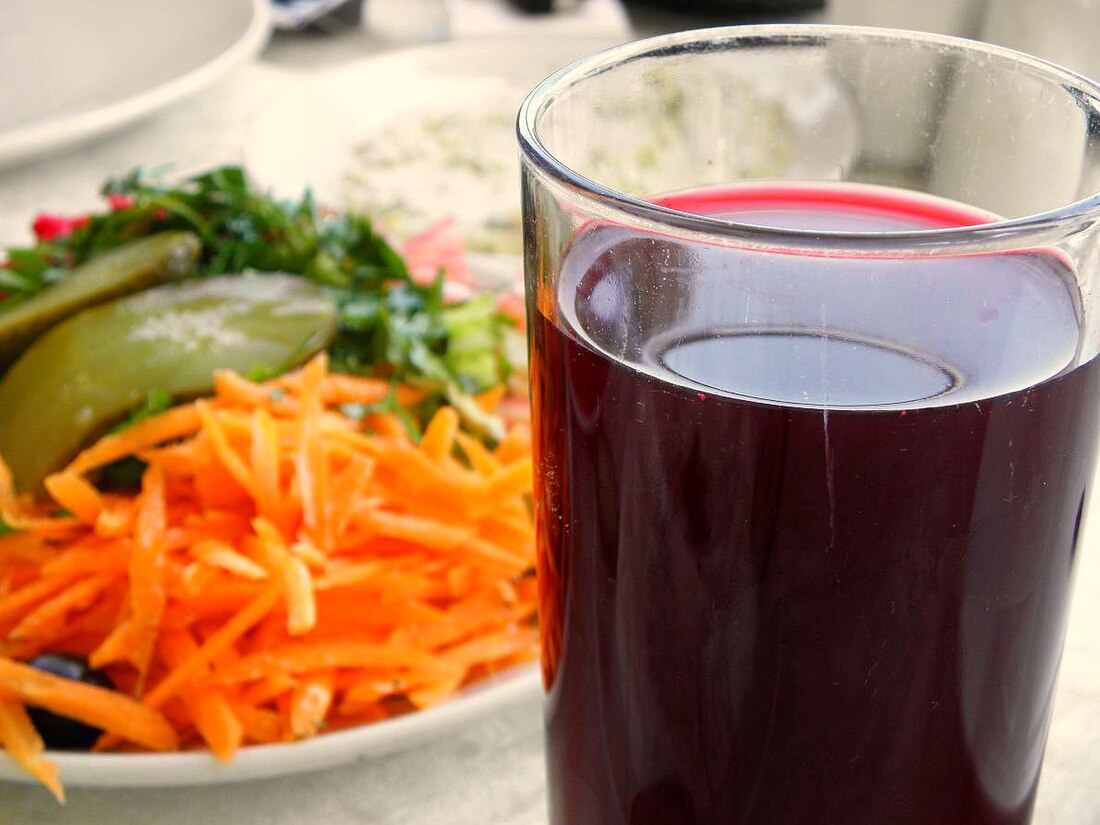Turnip water
Fermented carrot beverage from Turkey From Wikipedia, the free encyclopedia
Şalgam[1] or şalgam suyu[2] (Turkish pronunciation: [ʃal̴ˈɡam (suˈju)]; lit. "turnip (juice)"), is a popular Turkish traditional fermented beverage[3] from the southern Turkish cities of Adana,[4][5] Hatay, Tarsus,[6] Mersin,[7] Kahramanmaras, İzmir[8][9] and the Çukurova region. French traveler, naturalist, and writer Pierre Belon described its production method in the 16th century.[10] Şalgam is produced by lactic acid fermentation.[11][12] Studies have shown that the juice of the purple carrot used in şalgam reduces the effects of high-carbohydrate, high-fat diets in rats.[13] It is one of the most popular beverages during winter in Turkey.[14]
This article needs editing to comply with Wikipedia's Manual of Style. (February 2020) |

A slice of purple carrot, wedges of paprika and/or garlic is often added just before drinking.[15][16][17][18][19][20] Alongside rakı and ayran, it is typically drunk after eating kebab.[21] Şalgam is often served alongside the alcoholic drink rakı in a separate glass as they complement one another.[22][23] In some parts of Turkey, ayran and şalgam are mixed.[24]
Production
Although the Turkish word şalgam literally means "turnip", şalgam is made with the sour[25] and salty brine[26] of purple carrot pickles, salted, spiced and flavoured with aromatic turnip [27] (çelem) fermented in barrels [28] with the addition of ground bulgur and rock salt.[29][30] It is sometimes sold by street vendors who serve it from large goblets,[31] but there are also specialized shops that sell pickles called turşucu that sell non-industrial versions of şalgam.[16][32] There is no standard production technique used by the industry,[33][34] but the traditional method uses sourdough fermentation and carrot fermentation.[35] Since 1996 there exist factories for large scale industrial production of şalgam in Turkey.[36][37] The biggest producer of şalgam is the company Doganay Gida, whose market share of the annual production is nearly 95%.[38] While the drink is exported to both Europe and Japan there exists no large scale importation into America, a company called Ersu tried to sell it as "Black miracle drink" but the campaign was eventually cancelled.[39][40] While the industrial method takes 4–5 days, the traditional method takes 10 to 12 days.[41] The special taste of şalgam comes from lactic acid[42] and ethanol[43][44] The special process is an adaption of yeast fermentation and spontaneous lactic acid fermentation.[45]
Health benefits
While şalgam is commonly recommended as a cure [46] for hangovers, consuming excess amounts may cause bloating according to some sources.[47] Turkish custom holds that it helps with digestion.[48] It has been reported that the drink has positive health benefits,[49] because its anthocyanin content reduces the risk of disease - notably that of cancer.[50] Its high salt content does, however, mean that it possesses high levels of sodium that some researchers believe could prove dangerous for people with heart disease.[51][52] It contains β-carotene, group B vitamins, calcium, potassium, and iron and is drunk for its antiseptic effects.[41]
It has been reported that it helps in removing toxins from the body and reducing kidney stones. It is also used to treat pubertal acne, eczema, abscesses, whitlow, and hematomas.[53]
Şalgam is considered a functional food by some researchers since it is a diuretic that also cleans lungs and bronchi.[41]
Events
Şalgam, has been celebrated as a festival in Adana since 2010. The World Rakı Festival (aka Adana Kebap ve Şalgam Festivali), emerged from a hundred-year tradition of enjoying kebabs, with liver, şalgam and rakı. The event turned into a nationwide popular street festival; street musicians playing drums and zurna entertain visitors all night long on the second Saturday night of December.[54]
See also
Wikimedia Commons has media related to Şalgam.
References
Wikiwand - on
Seamless Wikipedia browsing. On steroids.
